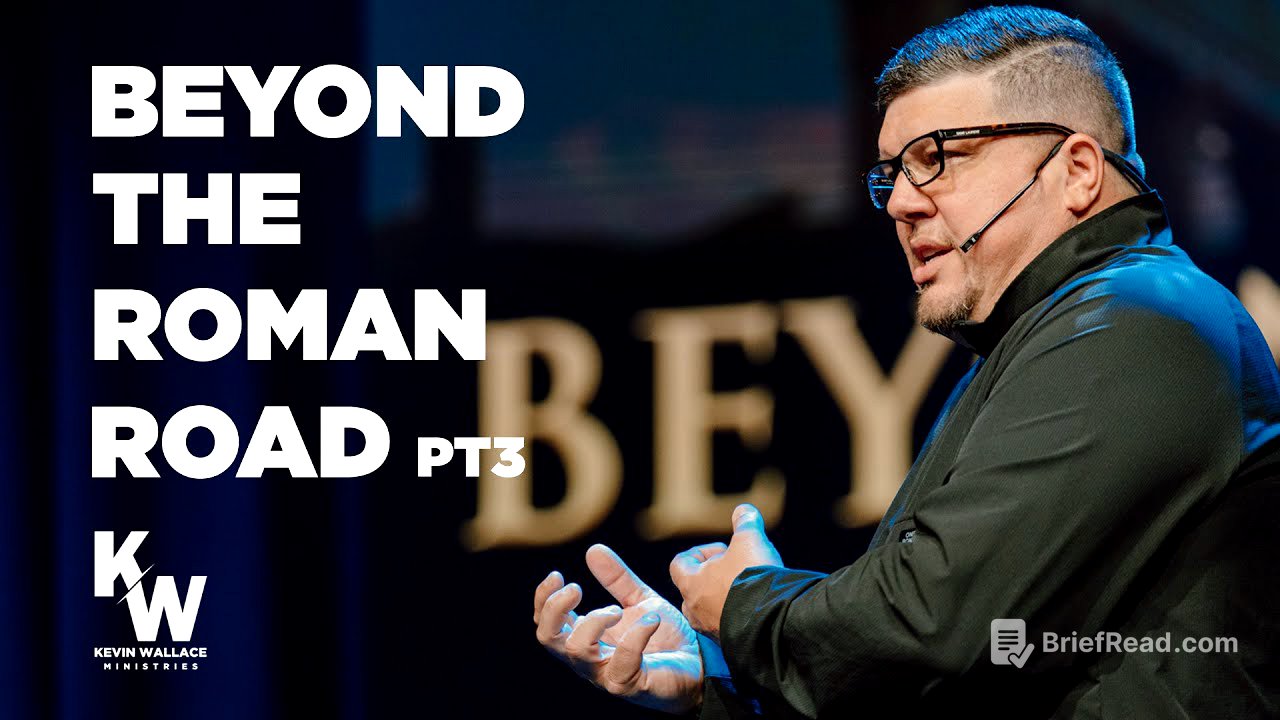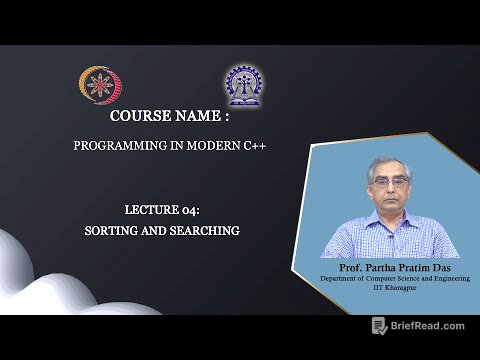TLDR;
This sermon focuses on understanding the death that occurs when one believes in Jesus and how it leads to freedom from sin. It emphasizes the importance of recognizing that the "old man" is crucified with Christ, allowing believers to walk in newness of life. The sermon also addresses the concept of sanctification, explaining it as a process of becoming more Christlike and drawing closer to Jesus, which leads to victory over sin.
- The death that occurs when one believes in Jesus is just as important as the new life received.
- Sanctification is the ongoing developmental journey of becoming Christlike.
- Believers are not meant to cope with sin but to conquer it through Christ.
- Sin may remain, but it shall not reign in the life of a believer.
- Reckoning oneself dead to sin is key to walking in victory over sin.
Introduction: The Importance of Praise and Revelation [0:01]
The sermon begins with a call to praise and worship, emphasizing that praise unlocks individuals from religious bondage and burdens. The speaker expresses gratitude for the "garment of praise" that replaces the "spirit of heaviness." He highlights the transformative power of the word of God, which cleanses and liberates the soul. The speaker also mentions that the study of Romans is proving to be profound and potentially lengthy, capable of setting people free.
Reading of Romans 6:1-6 and Prayer [1:43]
The scripture reading is from Romans 6:1-6, which discusses dying to sin and being baptized into Christ's death, leading to a newness of life. A prayer follows, asking for accuracy, anointing, and clarity in teaching the Bible, so that listeners can receive and apply the word to their lives. The prayer also seeks to remove distractions and paralysis, increasing the pace for the kingdom of God.
The Death That Occurs When Believing in Jesus [5:20]
The speaker introduces the sermon's central theme: the death that occurs when a person believes in Jesus. This concept might seem counterintuitive, but it's crucial for Christians struggling with sin. Understanding this death is vital for living a life of victory over sin. The speaker asserts that many Christians live their lives seeking deliverance from something they've already received, deceived by the lie that Christ didn't provide everything needed.
Sin Is Not Your Friend [8:43]
Sin is portrayed as an enemy that threatens one's future and seeks to destroy life. The speaker laments the church's apathy toward sin, reminding the audience that the wages of sin is death. Jesus came to conquer sin, not merely help people cope with it. The goal is to live free from the dominion, slavery, and bondage of sin, walking in the life Christ intended.
Justification vs. Sanctification [10:15]
The sermon transitions from justification to sanctification, defining sanctification as being set apart from sin to be set unto Jesus. It's not just about abstaining from sin but drawing closer to Jesus and being more in union with Him. Victory over sin comes from falling in love with Jesus, who is more appealing than the "junk" He brought you out of. Christians often cycle back into bondage because they get delivered from sin but fail to deepen their love for Jesus.
The Gospel and Reigning in Grace [12:51]
The speaker summarizes Romans 1-5, stating that believing in the gospel leads to righteousness and justification by faith, allowing grace to flow in one's life. He reminds the audience that they are not merely surviving until heaven but reigning in life through grace. Christians are kings with authority serving a king with all authority, and they should not accept what the devil gives but assert their authority over him.
Righteousness as a Gift and Sanctification as a Process [16:33]
Justification happens in a moment, making one righteous instantly, while sanctification is the ongoing process of becoming who we are already declared to be. The speaker addresses the issues in the Roman church: legalism and lawlessness (antinomianism). He emphasizes that grace is not an invitation to sin more but teaches us to deny ungodliness. Churches that normalize sin should be avoided, as sin will keep you longer and charge you more than you can pay.
Progressive Sanctification [22:18]
The speaker touches on theological camps that believe sanctification happens instantly upon salvation, but he argues for progressive sanctification, stating that he is more like Christ today than when he was first saved. Righteousness is a gift received immediately, but sanctification is an ongoing process that continues until Jesus returns or one leaves this planet.
Sin May Remain, But It Shall Not Reign [24:30]
The core message is introduced: "Sin may remain, but it shall not reign." Sin has been dethroned from being the king and owner of one's heart. The speaker clarifies that being dead to sin doesn't mean one won't occasionally fall or struggle, but it means not living in sin as a daily practice. True believers do not practice sin as a way of life; something in them hates the old life.
Discipline and the Love of God [27:49]
A Christian who sins feels remorse. God's discipline is an act of love, meant to keep believers from aborting their destiny and losing their purpose. Discipline is not punishment for past sins but guidance for the future.
Baptized Into His Death [29:59]
The speaker introduces the concept of being "baptized into Jesus Christ" and "baptized into his death." The key to living in peace with God is recognizing that one is dead to certain things. The "old man" was led by the sin nature, which needed a body to manifest. When one is saved, the "old man" dies.
The Old Man and the Casket [33:32]
The speaker uses a casket as a visual aid to remind the congregation of the death of the "old you." The reason for having new life in Christ is because He dealt with the old you. The moment you were born again, an old creature died. The speaker emphasizes that when you die to Jesus, you were put in Christ, and the old man was put in the tomb right beside Jesus and died with him.
Dying as You and Being Buried with Him [36:10]
When Jesus died on the cross, He died as you, so that you and your old self could die with Him. If you don't catch that, you will live your life in confusion thinking that you have two natures trying to rule when in reality there's only one nature left in a born again man. The old man did not just get put to sleep. The old man is dead.
The Old You Summarized by Sinful Pleasure [42:04]
The old you, summarized by its sinful pleasure and the sin nature dominating and ruling it, died with Christ the moment you trusted and believed in the Lord. Sin remains a possibility until we get to heaven. When sin comes knocking on the door of the heart, it has to talk to the dead man that's already been buried and dealt with.
Temptation and the Dead Man [45:21]
It is hard for a dead man to respond to temptation. The only way for sin to find a way to function and manifest in a believer is to actually get them out of their new identity and cause them to go back and live under the old self. If you don't understand the old you is dead, you will continually give sin the permission when temptation comes to take over a heart that's been justified by faith.
United in His Death and Resurrection [47:00]
The union with Christ is not just about heaven one day; it takes you back to the crucifixion. You died with Him because He died as you. The old man was crucified with Him so that the body of sin might be done away with. One who has died is free from sin.
Reckon Yourself Dead Indeed to Sin [51:56]
The most important scripture of the day is introduced: "Likewise you also reckon yourselves to be dead indeed to sin, but alive to God in Christ Jesus our Lord" (Romans 6:11). "Reckon" is a financial term, meaning to log or account for something. The key to walking in victory over sin is to account yourself dead to sin.
The Old Them Is the Dead Them [55:51]
The speaker emphasizes that the old them is the dead them. Don't drag around a dead corpse of who you used to be. The closer you stay to who you used to be, the easier it is for sin to find a place in you. The further you get away from that old life and the closer you get to Jesus, the harder it is for sin to find a way in.
The Key to Newness of Life [58:37]
If you reckon that the old you is dead, then you walk in the newness of life. The part of you who's been made new in Christ is not the place where the struggle exists; the struggle is with the old man that's dead. Remind yourself and remind the devil that is not who I am anymore.
Altar Call and Prayer for Freedom [1:00:51]
An altar call is made for those who need help reckoning the old man as dead and breaking cycles of sin. The speaker prays against hopelessness and shame, reminding listeners of the place Jesus prepared for the old man to die. Repentance is not just saying sorry but changing the way you think and coming into agreement with an identity that is in keeping with the one Jesus gave you. The old man is the only place where sin reigned, and sin does not have dominion over you. A prayer is offered for those who want to be saved and forgiven, breaking the chains of sin and giving new life.









